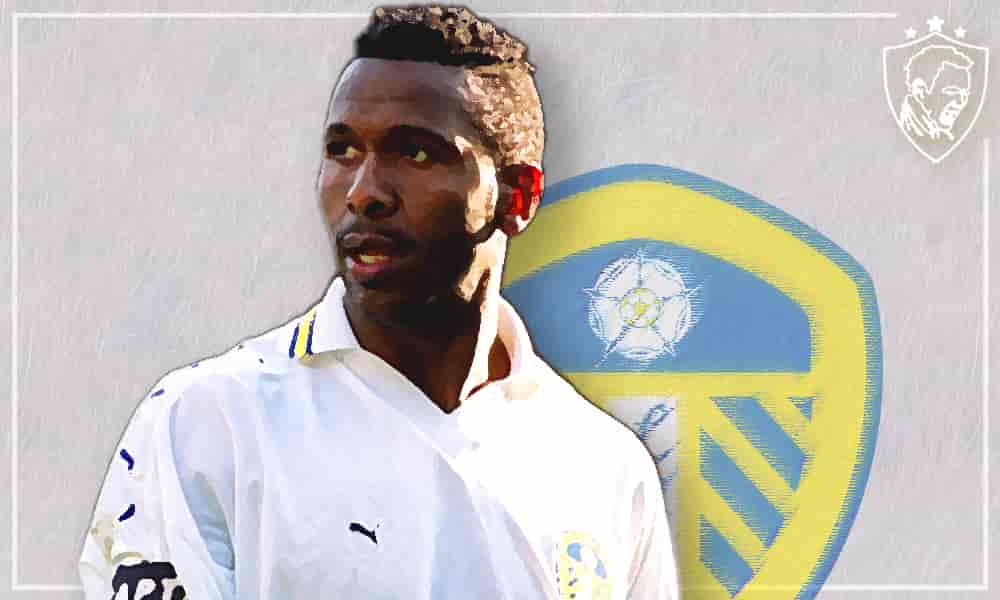Certain players mean a lot to certain teams. And fewer cases have been truer than with the Leeds fan base’s obsession with a certain South African stalwart from the noughties …
As the case of Lucas Radebe will explore, The Premier League is among the most culturally diverse footballing institutions in the world. We have been lucky enough to see talent from all corners of the globe showcase their skills here in England. World Cup winners, amazing goal scorers and defensive generals, we’ve seen it all.
When we talk about overseas footballing talents to play in the Premier League, you’ll probably think of fancy-footed Frenchman, silky-smooth Spaniards, amazing Argentines and dominant Dutchmen.
However, the cult hero I want to talk about isn’t from a country synonymous with footballing greatness at all …
South Africa is a brilliant sporting nation, renowned for producing exceptional cricketers like Jacques Kallis and Alan Donald, major-winning golfers such as Gary Player and Ernie Els, and more recently, the 2019 Rugby World Cup champions. So, when we’re talking about Premier League legends, South Africans may not be at the top of your list – To my knowledge, there are only 13 South Africans to ever play in the Premier League), and in my view, there is one player from the Rainbow Nation who stands out above the rest.
A personal hero of mine, Lucas Radebe came to the Premier League in August 1994, signing for Leeds United.
Radebe was following in the footsteps of the great Albert Johanneson, who was part of the early Revie era and arguably the first African player of colour to gain real prominence in the English game. Born in Soweto, Johannesburg during the apartheid era, Lucas used his love of football to escape the everyday troubles associated with that period in South African history.
He moved away from his family home for his own safety, and applied his trade in amateur football, impressing mainly as a centre-back, although he did play one game in goal (Radebe also donned the GK jersey for Leeds in 1996 against Manchester United).
He turned professional at 20 years old and began his career at the Kaizer Chiefs, making 113 appearances for Johannesburg’s most prestigious club before moving to the Premier League. Lucas’s move to Europe nearly never happened. With a host of top European scouts interested in him, tragedy struck as he was shot only a few blocks from his house in the Diepkloof region of Soweto.
Luckily, the bullet missed any vital organs and Radebe made a full recovery before coming to Leeds. Whilst he was signed by Howard Wilkinson, Radebe’s talents came to fruition under the tenures of George Graham and David O’Leary. Fiercely patriotic, he played a big part in South Africa’s first and only African Cup Of Nations title in 1996.
A historic win for a country that had been banned from the competition for all bar two renewals of the tournament.
Nicknamed ‘The Chief’, Radebe was given the captaincy of both club and country in 1998, leading Bafana on the world’s biggest stage whilst cementing himself as a defensive stalwart at Elland Road. Radebe in full flight was sensational to watch. A fierce competitor who’d put his body on the line every weekend, endearing himself to the Elland Road faithful almost as soon as he arrived
From 1998 to 2002, O’Leary’s Leeds finished in the top five for four consecutive seasons, with the lionhearted Radebe starring alongside the likes of Ferdinand, Woodgate and Matteo in defence. Skippering the side against Real Madrid at the Bernabéu in March 2001, Radebe sustained a knee injury, a problem that he would battle, among other issues, for the rest of his career.
Much like fellow fan favourite Olivier Dacourt, his domestic career isn’t all that decorated. What makes him special is the person behind the athlete. Although he was a tough-tackling, no-nonsense defender while at work, his smile was infectious, and he was widely renowned as one of the game’s true gentlemen.
The Chief was recognised by FIFA in 2000 as he was given the Fair Play Award for his efforts in fighting racism in football, and in a visit to Leeds in April 2001, the great Nelson Mandela declared that Radebe “is my hero”. He was also given a PFA Merit Award for his contribution to English football in 2010. So clearly, Lucas Radebe was, and still is, one of Elland Road’s favourite sons, and that was reflected in the nigh-on 40,000 strong crowd that turned out for The Chief’s testimonial in 2005.
Radebe’s name still echoes around LS11, a true mark of his status within Leeds United.
